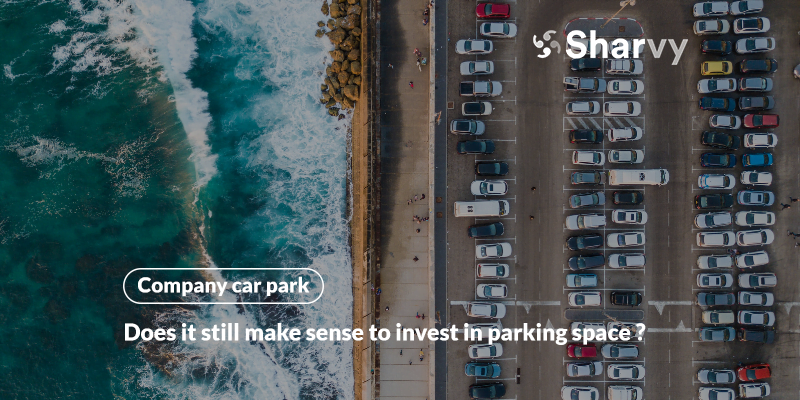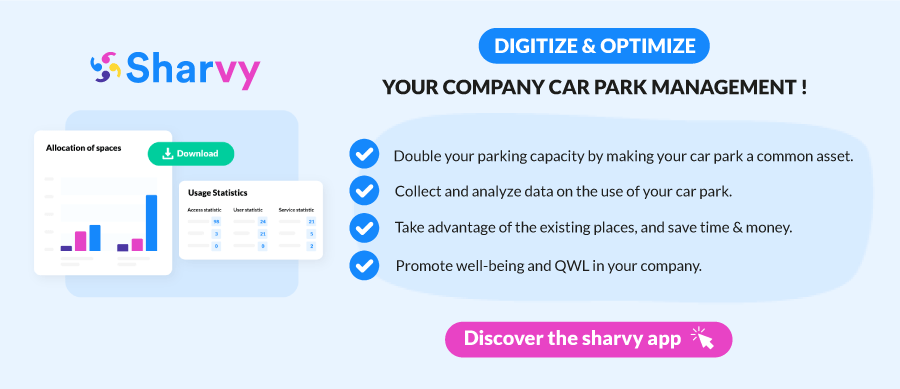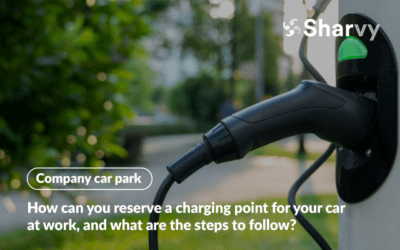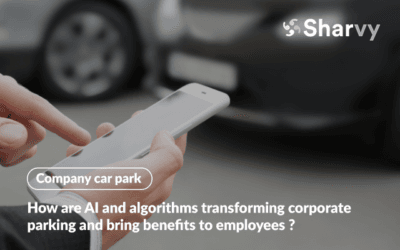It’s a fact that is now known! According to an Ipsos study conducted in January 2022, the car remains the majority solution, at over 75%, for commuting to work.
The freedom and convenience that the car provides (personal comfort, dropping off children, perceived hassle) are reasons that can explain this preponderance.
This is why companies are not legally obliged to provide their employees with parking spaces. However, many still offer parking access to improve well-being, quality of life and working conditions.
However, without a well-thought-out and fair parking policy, company parking rarely benefits all employees. In most cases, only 25% to 30% of a company’s workforce can benefit from this comfort daily.
In response to these frustrations, many companies wonder whether investing in additional parking spaces makes sense. But isn’t this a bad idea? The answer in this article!
Choosing to invest in parking spaces : what profitability can you expect and for what purpose?
One of the main reasons companies invest in additional parking spaces is the need for more parking spaces and the resulting problems for employees. These include delays, dissatisfaction and possible internal conflicts, feelings of inequality, and additional expenses related to on-street parking (parking meters, fines, impound fees, etc.). Thus, making such an investment aims to provide more comfort, peace of mind, and security for a more significant number of employees.
At the same time, purchasing new parking spaces can be envisaged to build up a rental return. The return on investment for such a purchase varies between 6% and 11% per year in major cities.
At first sight, this may seem very interesting! This is why many companies are tempted to make this investment. But is this the case?
Invest in parking spaces : the new eldorado for companies or a false idea?
Let’s not beat about the bush! Investing headlong in additional parking spaces is a bad idea for a company.
The reason ? It may be hard for many companies to believe. Still, the simple reason is that by transforming the passive management of your company car park into intelligent and active management, you can expect just as much return (human and financial) as with the purchase of new parking spaces.
Indeed, let’s remember that today, the new paradigms of the working world (work flexibility, corpoworking, and generalization of teleworking), upset the “classic” management of the company parking.
As a result, on average :
- 10% of a company’s employees are absent daily for various reasons: teleworking, business trips, illness, family emergencies, etc.
- 1 to 2 days per week, when they do not use the company car park.
- 25 days a year, when employees are on holiday, and again, will not use the company car park and/or their named spaces.
All in all, there will be about 100 to 120 days a year when employees will not use the company car park, which is approximately 1/3 of the working time! As a result, many parking spaces will remain vacant daily. These spaces, which are often allocated, cannot be used by other employees, leading to frustration, annoyance, and internal conflicts if this happens again.
Therefore, one of the first things to do before rushing headlong into buying additional parking spaces is to optimize your company’s parking management and parking policy.
The solution? Optimize your car park and make your vacant parking spaces profitable!
By doing this, you will get much more profit than by investing in new parking spaces alone.
Surprising? Not really, because when you optimize your company car park, you can expect to :
- Reduce the number of vacant spaces and optimize the occupancy rate of your car park.
- Avoid financing/building new parking spaces, and therefore save money.
- Define an equitable parking policy according to the singularities of the employees.
- Satisfy more employees and improve their quality of life at work!
As a result, once your company car park optimization has been established and your parking policy is installed and adopted by all employees, you can look forward to other horizons! Even more so if your employees are satisfied with this new management and each adopts a responsible and respectful attitude towards the community.
If this is the case, you can then decide that a part of your places will be dedicated to the rental and, therefore, cannot be reserved by your employees. Instead, you will keep the other part (the vast majority) for your employees and visitors (if you wish), which they will share among themselves.
This is the case of Subsea 7, which shares 80 parking spaces with 200 employees. Thanks to Sharvy, Subsea 7 achieves a ratio of 5 employees for one parking space (this is taking into account all employees, not just the 200 people with daily access) !
« The users are delighted with the user-friendliness of the application and the speed with which it sends them their confirmations. For the holders, nothing could be easier! They have complete control of their space and only need to confirm their needs every fortnight. It cuts out the middleman, which we love ! » Tim PETERSON, Security Department.
Want to know more about this project? Check out the Subsea 7 case study!
How do you do it? 3 action levers to activate before invest in parking spaces!
1. Position your car park as a shared asset to be managed collaboratively.
Like Subsea 7, to excel in managing your company car park, it must become a common good to be shared by all or some of your employees.
To achieve this, your employees need to anticipate their on-site presence and whether they need parking. But how does this work in practice daily?
- If an employee has a parking space and plans to be absent from the office, they will responsibly and independently release/share the parking space and return it to the “common pot.”
- Conversely, if an employee requests a parking space, they will make a reservation request (most commonly via a dedicated digital application). They will get a space according to a fair algorithm, such as the Sharvy application.
At the same time, by offering your employees visibility on the availability or unavailability of parking spaces within your car park, they will be able to better anticipate their needs and modes of transport.
For example, they may favor soft mobility, such as carpooling, cycling, and/or public transport, if they cannot reserve a parking space before their arrival on site.
In this way, they save time looking for a parking space close to their place of work and avoid the unnecessary stress of not being able to keep to their timetable.
2. Define a parking policy that is fair to all your employees!
Remember that today, equity is essential for creating and maintaining a good working climate. Not only does it offer greater satisfaction to employees, but it also removes frustrations and improves their quality of life and working conditions.
However, to guarantee it and consider it within your parking policy, you must first know your employees’ travel habits and their wishes. In particular, to improve the conditions of access to your company!
We advise you to survey your employees and internal communication to maximize the response rate.
You will then be able to define a fair and dynamic parking policy within your company more efficiently.
For example, by integrating digital technologies, the possibilities for managing your company car park are endless! You can envisage rules of good use, systems for prioritizing or sharing spaces between users, different rules of equity, etc.
3. Use appropriate management tools for your new parking policy!
Many company parking management tools offer effective sharing of parking spaces. And you don’t even have to lift a finger!
On this point, the Sharvy application allows you to take proactive measures tailored to your company! For example, reversing the trend of an individualistic society by restoring equity, sharing, and solidarity within companies.
- On the one hand, the application allows you to optimize and reinforce access control to the car park. On the other hand, it will enable you to activate and/or deactivate users and to modify, in just a few clicks, their access rights according to needs (departure from the company, mass recruitment, priority users, etc.). This digitization will also lead (if you wish) to the disappearance of badges and all the problems they cause (loss, theft, breakage, exchange, lack of flexibility, etc.). Access control can thus be optimized via an IoT module and/or a camera with number plate recognition.
- On the other hand, the application allows your employees (holders) to declare the use of their space and your employees (applicants) to make reservation requests. Sharvy then automatically distributes parking spaces according to a fair algorithm. On the day, and if the user has a reservation, he can access the company’s car park and park in the space indicated on the application.
Note that the Sharvy application can also provide access and a temporary parking space to visitors (service providers, customers, etc.) during their visit to the site.
Want to know more and/or get a study of your project? Then, ask for a demonstration of the solution! We will be delighted to assist you in your approach and advise you.
In conclusion
In the past, companies did not have to worry about managing company parking precisely because the resource parking was abundant and cheap. However, this is a reality for only some companies. The cost of mismanagement of resources is now substantial, and companies have no choice but to optimize them, excel, and save money!
This is why the issue of corporate parking management is so crucial in so many ways.
Therefore, if your objective is to save money on your parking budget and/or to obtain rental yields, the best solution is to avoid rushing headlong into buying additional parking spaces! Instead, the best solution for your budget and your employees is to optimize your company car park first, and then, if the need still exists, invest and obtain rental yields.
Have a question? Check out the following FAQ!
On average, how much can you expect to get when renting space in your company car park?
There is no doubt that prices vary according to the characteristics of the car park (individual, collective, covered, or open-air), the location, accessibility, and attractiveness of the city.
For example, in the 1st district of Paris, parking space costs an average of €35,491 monthly rent of €141 per month. This gives an average gross yield of 4.8%. On the other hand, in the 1st arrondissement of Marseille, parking space costs an average of 23,898 euros for a monthly rent of 106 euros. This gives an average gross yield of 5.3%!
However, beware! As with any property investment, the actual return will depend on other criteria. In particular, the ability to find a tenant easily to avoid vacancy and the level of local property taxes.
How do I know if my company car park needs to be optimized?
Thanks to our experience and our clients’ support, we have identified the problems that should lead to an optimization of your company car park.
For example, if many holders do not (regularly) use their parking space, it remains vacant most of the time. In addition, if your company is located in an urban area with a high attractiveness, the difficulty of parking outside the company car park can be significant! As a result, this can lead to internal complaints and/or conflicts, which ultimately degrade the quality of life and well-being at work.
At the same time, if you currently use an in-house tool (such as an Excel spreadsheet) to manage your parking policy, this may become too restrictive to work. This can become too restrictive to manage for equitable distribution of parking spaces and access management. In this case, it’s time to optimize your parking and invest in appropriate management tools like Sharvy!
Finally, if your company is planning to move and/or is considering a new building. This is also a good time to (re)start with a reasonable basis for your company parking management.
How can investment in parking spaces also address the improvement of accessibility for people with reduced mobility?
Investing in parking spaces goes beyond merely increasing the number of available spots; it also involves improving the quality and accessibility of these spaces. For companies, this means integrating parking spaces that are not only sufficient in number but also tailored to the needs of people with reduced mobility. By strategically positioning these reserved spaces near entrances and using a parking management solution to ensure their availability, companies can significantly enhance the accessibility of their infrastructure.
By making accessibility a priority, companies not only strengthen their regulatory compliance and commitment to social responsibility but also improve the overall experience for all users of their parking facilities, ensuring that investments are both inclusive and effective.
Want to learn more? Check out our latest articles!
Flexible office solutions : how to adapt them to all generations ?
How can flexible office solutions adapt to the needs of different generations? What are the best strategies to implement? Focus!
How do you reserve a charging point for your car at work?
How do I recharge my car at work? Do I need to reserve a charging point? What solutions are available? Here are the answers!
How are AI & algorithms transforming corporate parking?
How are AI & algorithms redefining corporate parking? What are the benefits for your company & your employees? Focus!
Subscribe to our newsletter!
Resources
Contact us
+44 117 463 6990







